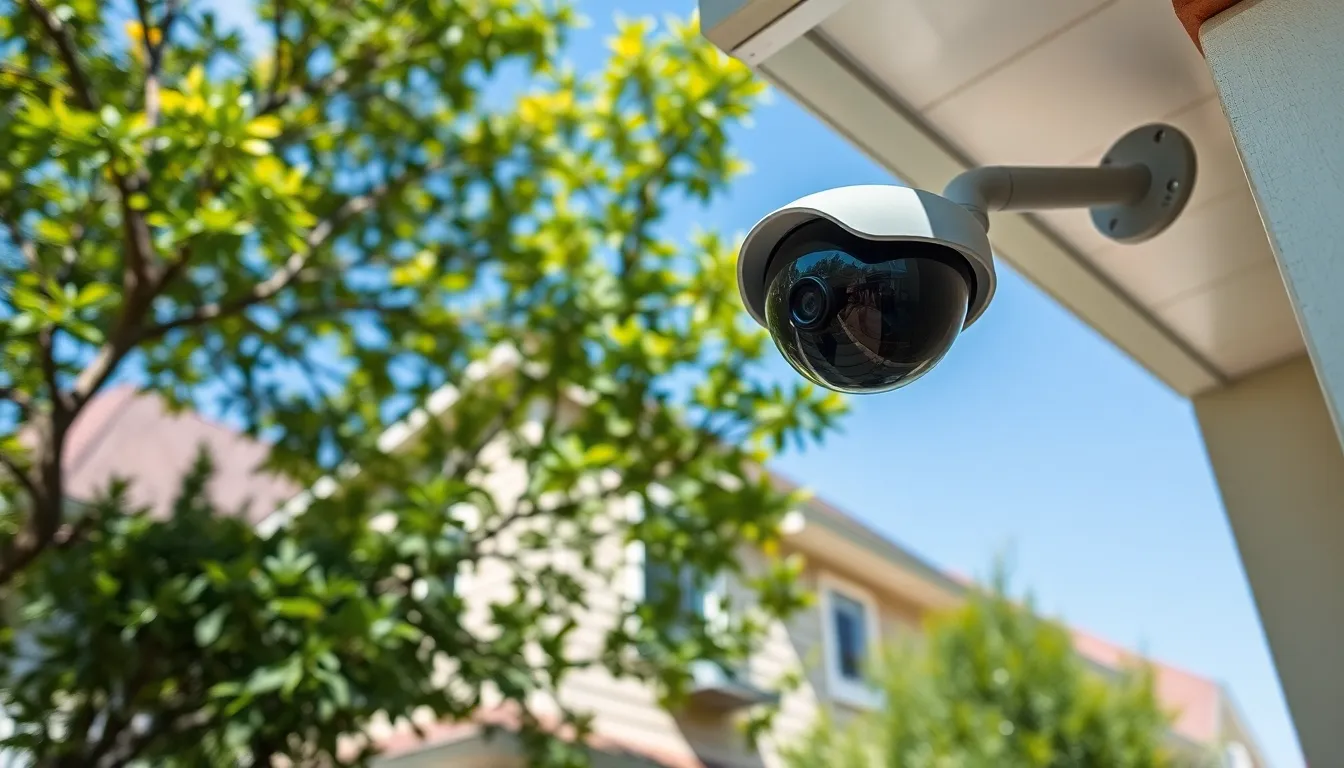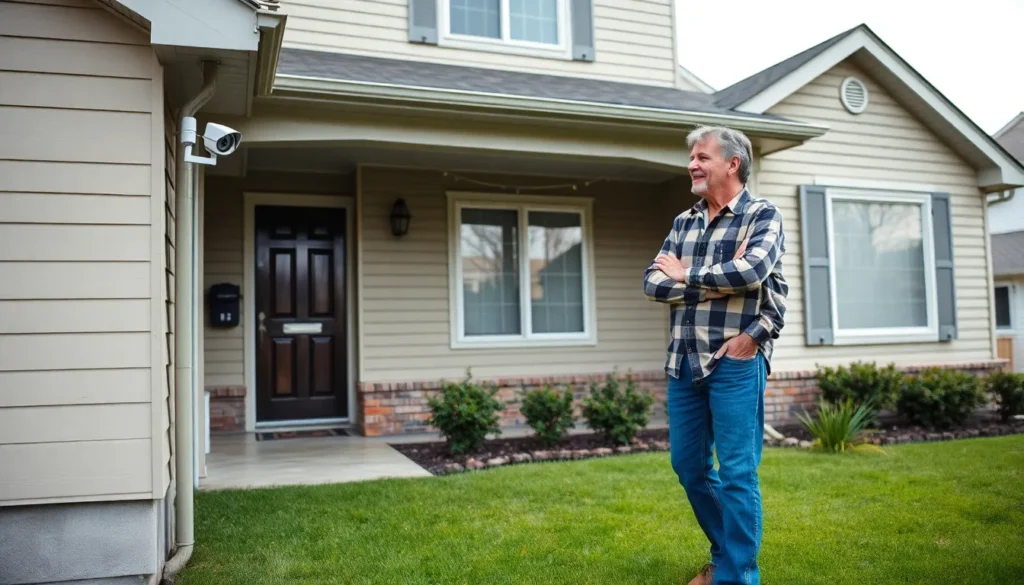Table of Contents
ToggleIn an age where safety is a top priority, house security systems have become essential for homeowners. With rising concerns about break-ins and property damage, investing in a reliable security system not only protects one’s home but also provides peace of mind.
Today’s security solutions go beyond traditional locks and alarms. They incorporate advanced technology like smart cameras, motion sensors, and mobile monitoring, making it easier than ever to keep an eye on one’s property from anywhere. Understanding the various options available can help homeowners make informed decisions to safeguard their living spaces effectively.
Overview Of House Security Systems
House security systems encompass a variety of technologies designed to safeguard homes from intrusions and threats. These systems often combine multiple components, including:
- Smart Cameras: Smart cameras allow homeowners to monitor their property remotely. They often feature high-definition video, night vision, and two-way audio for effective communication.
- Motion Sensors: Motion sensors detect movement and alert homeowners of potential intruders. They can be integrated with cameras for real-time monitoring and immediate response.
- Alarm Systems: Alarm systems emit audible alerts during a security breach, deterring intruders and notifying homeowners or authorities.
- Access Control: This includes keyless entry systems that enhance security by allowing controlled access through mobile apps, key fobs, or biometric scans.
- Smart Locks: Smart locks provide convenience and security. They enable remote locking and unlocking, ensuring that homeowners can manage access even when away.
Modern house security systems integrate with smartphones and other devices, allowing for real-time alerts and monitoring. Homeowners can customize their systems based on their unique needs and property layouts, ensuring comprehensive protection. Understanding these systems’ components and functionalities aids homeowners in making informed decisions for optimal security.
Types Of House Security Systems

House security systems primarily fall into two categories: wired and wireless. Each type offers unique advantages and functionalities based on homeowners’ specific requirements.
Wired Security Systems
Wired security systems connect components through physical cables. These systems often provide reliability due to consistent power sources and direct connections.
- Installation: Installation typically requires professional assistance to run wiring through walls and ceilings.
- Maintenance: These systems might demand more upkeep as cables can be subject to wear or damage.
- Performance: Wired systems often outperform wireless setups in terms of signal reliability and reduced interference.
- Cost: Initial costs may be higher due to installation expenses, though long-term maintenance costs can be lower.
Wireless Security Systems
Wireless security systems use radio signals to communicate between components, offering flexibility and ease of installation.
- Installation: Installation is generally straightforward, allowing homeowners to set up devices without professional help.
- Scalability: Wireless systems can be easily expanded with additional sensors and cameras.
- Mobility: These systems provide homeowners with the ability to relocate devices without extensive rewiring.
- Accessibility: Many wireless systems integrate with mobile devices, enabling remote monitoring and control from anywhere.
Both wired and wireless systems contribute to a comprehensive security strategy, with choices depending on factors such as budget, residence type, and personal preferences.
Key Features To Consider
When evaluating house security systems, potential buyers should focus on key features that enhance safety and convenience. Monitoring options and automation integration play crucial roles in effective home protection.
Monitoring Options
Monitoring options significantly impact a security system’s effectiveness. Customers can choose from three primary types of monitoring:
- Professional Monitoring: This service involves trained personnel who monitor alarms and alerts 24/7. In case of a breach, they contact emergency services on the homeowner’s behalf.
- Self-Monitoring: Homeowners receive real-time alerts via mobile apps, allowing them to respond immediately. This option offers control but may require greater vigilance from residents.
- Dual Monitoring: This combines professional and self-monitoring. Homeowners receive instant alerts, while professionals handle critical emergencies when needed.
Choosing the right monitoring type depends on personal preferences and the level of involvement desired in home security.
Automation Integration
Automation integration enhances the functionality of security systems. Several automation features include:
- Smart Lighting: Automatic lights can deter intruders by simulating occupancy when homeowners are away.
- Smart Locks: These allow for remote access control, enabling homeowners to lock or unlock doors through their smartphones.
- Connected Devices: Devices such as cameras, motion detectors, and alarms can communicate with each other, creating a cohesive security network that provides comprehensive coverage.
Integrating these automation features leads to a more responsive security system, allowing for greater peace of mind and convenience for homeowners.
Benefits Of Installing House Security Systems
House security systems offer significant advantages for homeowners, enhancing safety and providing peace of mind.
- Deterrence of Crime: Visible security cameras and alarms discourage potential intruders. Studies show homes with security systems are less likely to be targeted for break-ins.
- Constant Monitoring: Many systems provide real-time surveillance through smart cameras. Homeowners can monitor their property remotely via mobile devices, increasing responsiveness to incidents.
- Emergency Alerts: Security systems deliver immediate notifications during breaches. Homeowners receive alerts on their smartphones, ensuring prompt action can be taken.
- Insurance Discounts: Installing a security system often leads to reduced homeowners’ insurance premiums. Insurance providers recognize the lower risk of theft and damage, incentivizing homeowners.
- Enhanced Home Automation: Integration of smart home devices increases convenience and efficiency. Automated lighting and locks work together to strengthen security while providing comfort.
- Remote Access: Homeowners benefit from controlling their security systems remotely. This access allows for adjustments to settings and monitoring away from home.
- Increased Property Value: A well-installed security system can contribute to property value. Potential buyers often prioritize homes with existing security measures.
- Peace of Mind: Knowing that a home is protected fosters a sense of security. Homeowners can relax, confident that their property and loved ones are safeguarded.
Investing in a house security system is a proactive step toward safeguarding one’s home and loved ones. With a variety of options available homeowners can choose systems that best fit their needs and lifestyles. From wired to wireless solutions each type offers unique advantages that cater to different preferences and budgets.
By incorporating advanced technologies such as smart cameras and motion sensors homeowners can create a comprehensive security network. This not only enhances protection but also provides peace of mind. The integration of automation features further amplifies security capabilities making it easier to monitor and control home safety from anywhere.
Ultimately the right security system not only deters potential threats but also enriches the overall living experience. Homeowners who prioritize security can enjoy their space with greater confidence knowing they’ve taken essential steps to protect what matters most.





